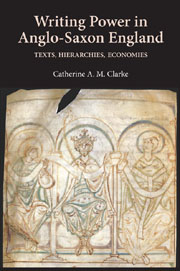Book contents
- Frontmatter
- Contents
- Acknowledgements
- Abbreviations
- Introduction
- 1 Order and Interlace: the Guthlac Poems of the Exeter Book
- 2 Sites of Economy: Power and Reckoning in the Poetic Epitaphs of the Anglo-Saxon Chronicle
- 3 ‘Absens ero … presens ero’: Writing the Absent Patron
- 4 Power and Performance: Authors and Patrons in late Anglo-Saxon Texts
- 5 Remembering Anglo-Saxon Patronage: the Libellus Æthelwoldi Episcopi and its Contexts
- Afterword
- Bibliography
- Index
- ANGLO-SAXON STUDIES
4 - Power and Performance: Authors and Patrons in late Anglo-Saxon Texts
Published online by Cambridge University Press: 05 February 2013
- Frontmatter
- Contents
- Acknowledgements
- Abbreviations
- Introduction
- 1 Order and Interlace: the Guthlac Poems of the Exeter Book
- 2 Sites of Economy: Power and Reckoning in the Poetic Epitaphs of the Anglo-Saxon Chronicle
- 3 ‘Absens ero … presens ero’: Writing the Absent Patron
- 4 Power and Performance: Authors and Patrons in late Anglo-Saxon Texts
- 5 Remembering Anglo-Saxon Patronage: the Libellus Æthelwoldi Episcopi and its Contexts
- Afterword
- Bibliography
- Index
- ANGLO-SAXON STUDIES
Summary
This chapter will explore ways in which relationships between authors and patrons (whether real or imagined) are constructed in a selection of tenth and eleventh-century texts. It will look at a range of sources to examine how literary patronage, as represented in late Anglo-Saxon texts, is figured through the performance of a repertoire of roles and the adoption of different personae. These carefully-shaped and sustained textual performances allow author and patron to assume different (and often shifting) places within the hierarchies and economies of power and agency involved in literary production. These textual performances also involve complex networks of complicity and collaboration. For example, in cases where real patrons (that is, known historical figures connected with the production or reception of the work) are involved, we find evidence of complicity between author and patron in shaping and accepting the roles assigned to each other within the text. Across the texts examined here, the complicity of the audience also plays a major part, in both recognising the conventions and tropes through which these performed roles are cued, and in decoding the systems of hierarchy, power and economy implied.
This discussion will pay particular attention to how the performance of a range of gendered roles by author and patron can provide a metaphorical vocabulary for articulating the hierarchies and economies of agency involved in literary production. Across these texts, we find a range of variously gendered roles and relational identities which are inhabited by authors and patrons (both male and female) in order to figure their different, and often fluid, positions within the real or imagined interactions and hierarchies which enable the production of a text.
- Type
- Chapter
- Information
- Writing Power in Anglo-Saxon EnglandTexts, Hierarchies, Economies, pp. 112 - 144Publisher: Boydell & BrewerPrint publication year: 2012



